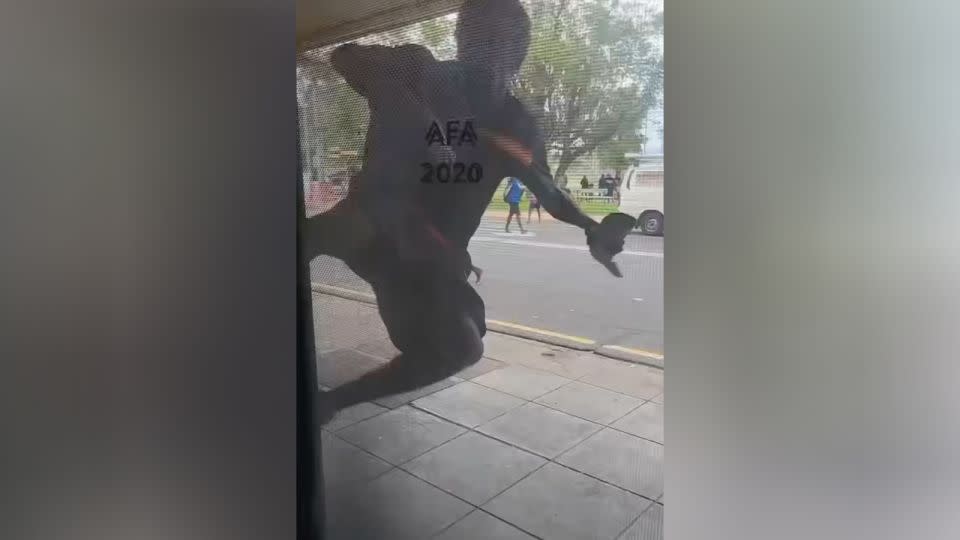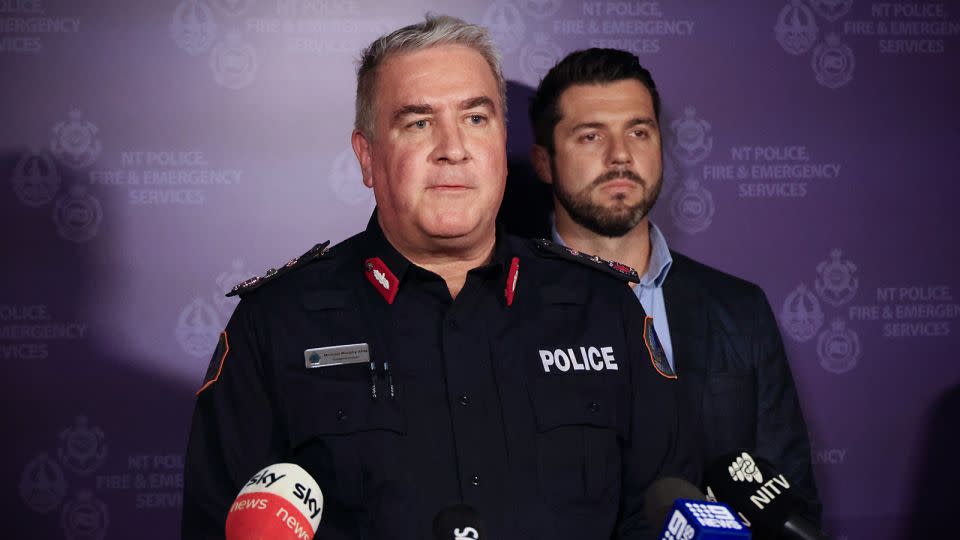A town has imposed a curfew on its children as it grapples with youth crime
Emotions were running high in the Australian town of Alice Springs this week when mourners attending the funeral of an 18-year-old man attacked its oldest pub, smashing windows and kicking doors.
For Northern Territory officials, Tuesday’s violence – and clashes later that night involving around 150 people armed with axes, machetes and knives – was the final straw.
“Enough is enough,” Chief Minister Eva Lawler said Wednesday, as she announced a two-week curfew for children between 6 p.m and 6 a.m in the central business district.
“If someone is under the age of 18 and they’re seen out in the town center, they will be taken home or taken to a safe place. Kids are not safe on the street,” she said.
Since then, relative calm has returned to Alice Springs, or Mparntwe, its traditional name. But debate has raged over the effectiveness of the emergency measures that some described as a knee-jerk response to complex social issues.
Some Indigenous groups and leaders have backed the action as a necessary circuit-breaker, but others say what local children need is support, not more policing in a country with a low age of criminal responsibility and high rates of incarceration for Indigenous youth.
Complex problems
Northern Territory officials said the trigger for Tuesday’s violence occurred three weeks ago when an 18-year-old man died in a car accident during the early hours of March 8.
At the time, local news reports said he was sitting on a door of a suspected stolen vehicle, when it turned a corner and rolled on top of him. Eight people fled the scene.
Darren Clark, founder of community group Action for Alice, said youths rampaged through the town on Tuesday smashing windows before attacking the Todd Tavern, a well-known hotel and bar.
He said the group appeared to be seeking retribution.
“They’re looking for the driver of the car … So, that’s what this is all about,” Clark told radio station 2GB Sydney.

According to police, the mourners in Alice Springs came from Utopia, a region around 230 kilometers (143 miles) to the north-east that’s home to several large Aboriginal communities.
It was named Utopia by German settlers, who were said to have been fascinated by the abundance of rabbits that were easy to catch. It’s now known as a hub for Indigenous artists whose work is sold worldwide.
Utopia suffers many of the same problems seen in Indigenous communities nationwide – overcrowded housing and high levels of domestic violence, unemployment and alcohol abuse.
The issues are widely considered to be the legacy of colonization more than two centuries ago that deprived traditional owners of their ancestral lands.
Decades of racism and neglect erupted on the streets of Alice Springs on Tuesday, though youth crime is a problem in many other Australian cities.
“This is an issue that is absolutely complex. I know people don’t always like to hear the word complex, but when you see young people who have fetal alcohol [syndrome], that have trauma, that have experienced domestic violence, that go to homes where there’s alcohol, they’re not cared for. Those are the issues that are part of the story of Alice Springs,” Lawler said.
Alice Springs Mayor Matt Paterson told 10 program “The Project” that some children are on the streets at night because it’s safer than being at home.
“These children are out here because there’s drunk parents, or there’s family and sexual violence happening at home,” he said. “If this curfew saves kids’ lives because it takes it gives the police the power to take them to safe places, then I think that it’s absolutely worth it.”
Children behind bars
Some Indigenous leaders support the curfew and are working with the government to implement it, but other groups say there hasn’t been enough consultation.
Jared Sharp, Principal Legal officer of the North Australian Aboriginal Justice Agency (NAAJA), told Sky News the curfew could make matters worse.
“There is nowhere in the world that has said that a youth curfew is effective – it just criminalizes young people. It ensnares young people in the justice system, and that’s just not what we need in a place like Alice Springs, where the rates of Aboriginal people in jail and youth detention are already off the charts,” Sharp said.

Last August, the Northern Territory became the first Australian jurisdiction to raise the age of criminal responsibility from 10 to 12. According to the latest government figures, on an average night in the June quarter of 2023, more than 800 children were in detention across Australia – 60% were of Aboriginal or Torres Strait Islander descent. The figures show Indigenous children are 29 times as likely to be in detention than non-Indigenous youth.
Writing in the Guardian, Catherine Liddle, CEO of the Secretariat of National Aboriginal and Islander Child Care (SNAICC), said Indigenous children are being exposed to unacceptable levels of violence.
“We cannot arrest our way out of this,” she wrote. “Alcohol and substance abuse is a symptom as well as one of the drivers and it is not the only one … It is no accident that we are seeing youth crime escalating as rates of Aboriginal and Torres Strait Islander child removals grow.”
Sixty more police arrived in Alice Springs this week to build a more visible police presence during the curfew period, and police liquor inspectors were allocated to patrol liquor stores in the area.
Addressing the media on Thursday, Northern Territory Police Commissioner Michael Murphy said the measures weren’t about “locking up kids.”
“The objective is to keep kids out of the criminal justice system,” he said. “If they do commit violent crime, they will be arrested and taken to the court where they can answer to a judge and go through the justice system.”
In the early hours of Friday, three youths aged 12, 13 and 17 were arrested in Alice Springs after allegedly entering a home with weapons and threatening one of the residents with a firearm, according to police. They allegedly stole keys to two cars that were later found abandoned south of the town’s business district.
Children in the Northern Territory are due to go on school holiday next Friday – the curfew is expected to cover at least part of the break, but territory officials haven’t ruled out extending it, if needed.
For more CNN news and newsletters create an account at CNN.com


